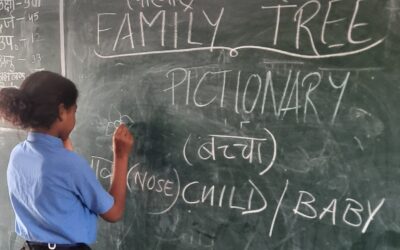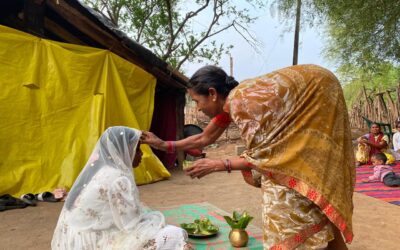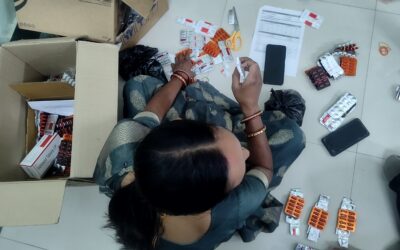A year and a half ago when I boarded a train to Panna, I was sharing a berth with a middle-aged lady. She was keen to know where I was going. When I told her I was going to Panna, her response was, “Acha, tiger reserve ghumne ja rahe hai aap?” What started as general chitchat, now became a full-fledged conversation about India Fellow and getting placed in Project Koshika as a part of the fellowship.
After a few rounds of questions, she ended our conversation by making a statement that I remember till date. She said,
“Panna teen cheezo ke liye baut prasidh hai. Tiger Reserve, heere ki khadaanein aur jaativaad.” (Panna is famous for 3 things in particular. Its tiger reserve, diamond mines and casteism).
I smiled and made a remark or two before calling it a night and dozing off.
All our school and college life, we come across and learn about a plethora of systems, practices, and beliefs that exist in our society. Classism, sexism, casteism, racism, and so on. I have spent more than half of my life in a metropolitan city like Jaipur. I was mostly sheltered from the realities of the world. These narratives always existed in textbooks for me. Incidents of caste discrimination were only a piece of news headline for me, it was never in my face. Well, not until I reached Panna.
The first time the caste conversation played out was when my Brahmin landlord told me that eggs, meat, or any sort of non-vegetarian food were a clear no-no. A work colleague would casually read out jokes from his Panna Brahmin ally group. I overheard my neighbor next door explaining to her child to not get into fights with my landlord’s son. “Hum ek hi samaj ke hai, usse mat ladna”, she said.
A little while later, I realized that staff on the field have a different sets of clothes for home and for Village Health Nutrition Day (VHND). On VHND days, the staff was expected to interact and come in physical contact with tribal women and lower caste groups. To fight anemia, one of our interventions was to make nutrition ladoos for pregnant women and malnourished children. Sooner or later, we realized the model is not sustainable for us to continue. We were looking for vulnerable groups of women from the community, who needed a means to generate livelihood, to make the laddoos on their own and distribute it themselves. However, that did not work out as well because high-risk women who belong to upper-caste groups wouldn’t consume these ladoos. This was because a lower caste woman had prepared it. Caste took priority over health.
‘Basor’ is a scheduled caste group living in several regions of Bundelkhand. Basorans are women who are called post deliveries to clean blood, placenta, amniotic fluids. Basically, they collect all bodily fluids that are released from a mother’s body post-delivery. There was a time in Kathari village, when a woman delivered a child at 10 AM but the village basoran was not present at that time. It was only at 3 PM when another basoran from a nearby village showed up and began the process of cleaning. The mother laid in the same condition for 5 long hours. Nobody else would do the ‘dirty work’.
Every incident was a reality check of how strong caste dynamics are weaved and ingrained in Panna.
It pained me to know that children are not spared as well when it comes to caste-based discrimination. Our team attended Gahadra panchayat’s Gram Sabha which was conducted on the 26th of January. One of the topics that came up was that an SHG woman who was employed to wash utensils after children are done eating in Anganwadi is not cleaning the utensils of children who belong to marginalized caste groups. After the Gram Sabha, when I got an opportunity to speak to her, she mentioned,
“Aap logon ke liye bolna aasan hai didi, yahan dehaat mein jaat se badi koi cheez nahi hoti. Main chupke se bartan dhoti rahi, lekin ye baat mere samaj ke logon ko pata chal gayi. Unhone mera mazak udaya, mera bahishkar kiya aur kaafi samay mujhe kisi shaadi, tyohaar pe nahi bulaya. Uske baad se meine unke bartan dhona band kar diya hai. Aap hi bataiye mein kya karu?”.
(Caste might not be a big deal for you but it accounts for everything here. I used to secretly wash everyone’s utensils. Word still got around. My community members laughed at me, boycotted me and excluded me from weddings, celebrations and festivities. After that, I decided to only clean plates of children who belonged to the same community as mine. What else should I do?)
I failed to provide a solution. Even when the woman made the decision to clean the utensils willingly, there were repercussions that she had to face. Do I look at her plight? Do I look at the fact that a few select children as young as 4 and 5 have to clean their own utensils, while others enjoy their daily meal and leave? One of the solutions was that she would wash no one’s dishes and everyone would clean their own. But is that something we expect from a couple of 4-5-year-olds? The solution that was proposed was to hire a woman who comes from one of the marginalized castes.
In hindsight, I don’t know if this solves anything, but one really has to choose their battle! In my opinion, it reiterates the obsession that governs the social stigma of ‘caste and purity’ and perpetuates social exclusion. I am taken back to our induction training, where our facilitator Anupama once mentioned, “Please don’t get offended if someone on the field asks you your caste. That’s their version of small talk”. It is only now that I am realizing how much weight my last name carries.




0 Comments